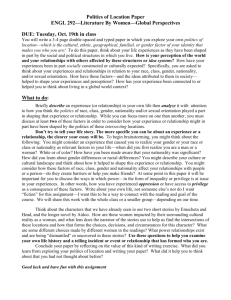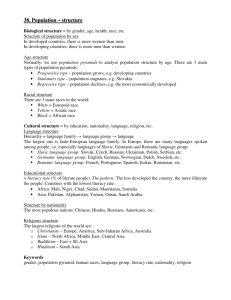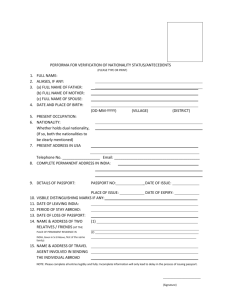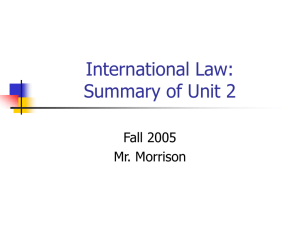Nationality Decrees in Tunis and Morocco, PCIJ
advertisement
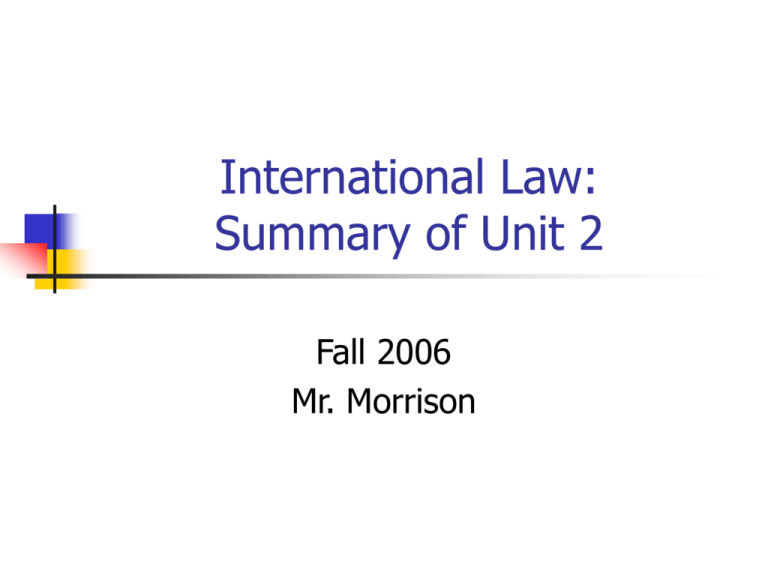
International Law: Summary of Unit 2 Fall 2006 Mr. Morrison States and their formation Qualities of Statehood Fall 2006 Territory Population Government Independence/Ability to Conduct Foreign Relations Also, possibly, willingness to observe international law and human rights International Law: Unit 2 2 Types of jurisdiction To Prescribe (to make rules or laws) To Enforce (to carry out rules or laws) To Adjudicate (to decide cases) Note that the “prescriptive jurisdiction” about which we are talking is different from “judicial jurisdiction” of courts Fall 2006 International Law: Unit 2 3 Prescriptive Jurisdiction of States Traditional bases Fall 2006 Territorial Nationality Protective (limited to “important State interests”—counterfeiting, fraud, etc.) Universal International Law: Unit 2 4 Additional jurisdictional issues “Active/passive” (or the “effects doctrine”) expands jurisdiction to cover acts that affect the territory or citizens of a country Many Civil Law countries legislate to cover acts of their citizens everywhere Fall 2006 International Law: Unit 2 5 Conflicts of jurisdiction Situations can arise in which 2 or more countries claim jurisdiction over same conduct Each can exercise jurisdiction, the issue is how to reconcile this Fall 2006 International Law: Unit 2 6 Conflicts of Jurisdiction Restatement of Foreign Relations Law of the US, 3rd, sec. 403 calls for a rule of reasonableness In exercising jurisdiction In deferring to the other State if it has a stronger interest But—conflicts can still occur This view is broadly accepted elsewhere Fall 2006 International Law: Unit 2 7 Jurisdiction to enforce Largely territorial Alvarez Machain or Ker v. Illinois Fall 2006 US courts do not test in criminal trial the international legality of seizure of criminal defendant abroad But there may be diplomatic or other consequences International Law: Unit 2 8 Jurisdiction to adjudicate See the Conflicts of Laws course Fall 2006 International Law: Unit 2 9 Nationality Nationality indicates belonging to a State Fall 2006 Nationality confers right of State to protect and right of the national to claim protection Citizenship may be a narrower concept, indicating political rights as well International Law: Unit 2 10 Bases of nationality Nationality by birth Acquisition of nationality By place of birth (ius solis) By parentage (ius sanguinis) By naturalization Nationality is a matter of national law Nationality Decrees in Tunis and Morocco, PCIJ But there must be some minimum connection Nottebohm Case Fall 2006 International Law: Unit 2 11 Rights and duties of nationals Rights To enter the State of nationality To have protection of that State Duties Fall 2006 Subject to jurisdiction of State International Law: Unit 2 12 US Law on Nationality Citizenship by birth Fall 2006 In the U.S., U.S. Constitution, Amendment XIV, sec. 1 Outside of the U.S. to 2 U.S. parents Outside of the U.S. to 1 U.S. parent, if that parent lived in the U.S. for 5 years (detailed) International Law: Unit 2 13 US Law on Nationality By naturalization Must renounce prior citizenship But some countries don’t accept that Acts renouncing citizenship Fall 2006 Formal renunciation Voting, military service in foreign country International Law: Unit 2 14 Dual nationality Multiple nationality can occur If within a State of nationality Can create conflicting obligations Cannot claim diplomatic protection of another State of nationality Predominant nationality rule Fall 2006 International Law: Unit 2 15 A Digression: Extradition, Deportation, Exclusion Extradition—removal of person to face charges abroad Deportation—removal of an alien from the State Exclusion—denial of entry to an alien Fall 2006 International Law: Unit 2 16 Extradition Extradition treaties Usually enumerate or describe offenses covered; other offenses are not covered Political offenses exception Rule of speciality—trial only for offense charged in extradition papers Under US law there must be a treaty or statute to support the extradition Fall 2006 International Law: Unit 2 17 Extradition (limits) Many Civil Law countries will not extradite their own citizens, but will try them at home for the offense abroad Many European (and some other) countries will not extradite if capital punishment is a possiblity Fall 2006 International Law: Unit 2 18 State responsibility A State that violates international law incurs State Responsibility Consequences Fall 2006 It must cease its breach Other States may take countermeasures It may pay reparations International Law: Unit 2 19 State responsibility International Law Commission adopted Draft Rules on State Responsibility in 2001 UN General Assembly accepted its report, but did not call diplomatic conference to write a treaty Status of draft rules? Fall 2006 International Law: Unit 2 20 State responsibility rules A state is responsible for— Fall 2006 Acts of an organ of the State (art. 4) Conduct of a person who is authorized to act for the State (art. 5) Conduct of organs placed at the disposal of a State by other States (art. 6) Conduct directed or controlled by the State (art. 8) . . . more International Law: Unit 2 21 State responsibility rules A state is responsible for— Fall 2006 Persons exercising governmental power in the absence of official gov’t (art. 9) Some acts of an insurrectional movement (art. 10) Acts acknowledged and accepted by the State (art. 11) Acts in aid of wrongful acts of other States (arts. 16 et seq.) International Law: Unit 2 22 But no responsibility for Self-defense (art. 21) Countermeasures (art. 49 et seq.) Limited to non-performance of obligations Protection of human rights and humanitarian law obligations Proportionality (art. 51) Notice and other conditions (art. 51) Fall 2006 International Law: Unit 2 23 Consequences of State responsibility Duties to continue to perform duties and to cease violations (arts. 29-30) Reparations (art. 33) Fall 2006 Restitution Compensation Satisfaction International Law: Unit 2 24 Other interntional obligations Liability for transboundary harm from hazardous activities Fall 2006 Draft on Prevention adopted 2001 Draft on Liability still under consideration by the International Law Commission International Law: Unit 2 25
